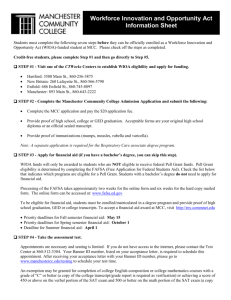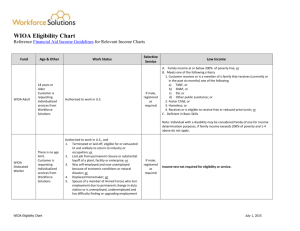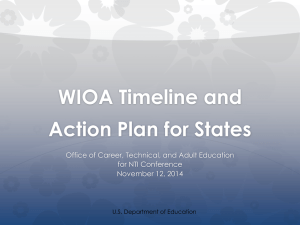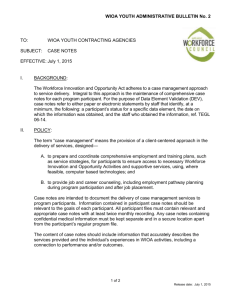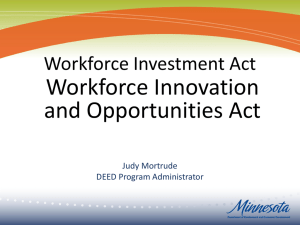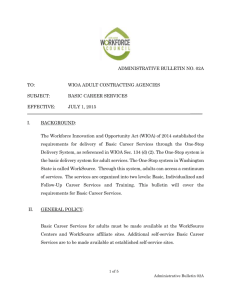Part II - WIOA Specific Terms - Connecticut Department of Labor
advertisement
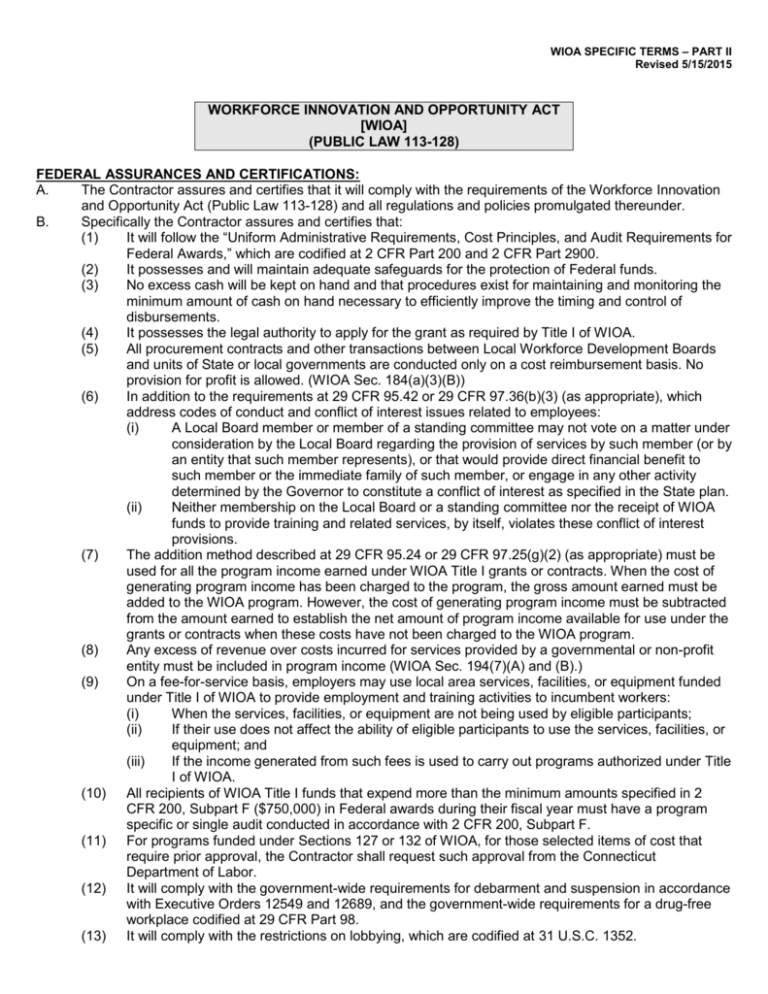
WIOA SPECIFIC TERMS – PART II Revised 5/15/2015 WORKFORCE INNOVATION AND OPPORTUNITY ACT [WIOA] (PUBLIC LAW 113-128) FEDERAL ASSURANCES AND CERTIFICATIONS: A. The Contractor assures and certifies that it will comply with the requirements of the Workforce Innovation and Opportunity Act (Public Law 113-128) and all regulations and policies promulgated thereunder. B. Specifically the Contractor assures and certifies that: (1) It will follow the “Uniform Administrative Requirements, Cost Principles, and Audit Requirements for Federal Awards,” which are codified at 2 CFR Part 200 and 2 CFR Part 2900. (2) It possesses and will maintain adequate safeguards for the protection of Federal funds. (3) No excess cash will be kept on hand and that procedures exist for maintaining and monitoring the minimum amount of cash on hand necessary to efficiently improve the timing and control of disbursements. (4) It possesses the legal authority to apply for the grant as required by Title I of WIOA. (5) All procurement contracts and other transactions between Local Workforce Development Boards and units of State or local governments are conducted only on a cost reimbursement basis. No provision for profit is allowed. (WIOA Sec. 184(a)(3)(B)) (6) In addition to the requirements at 29 CFR 95.42 or 29 CFR 97.36(b)(3) (as appropriate), which address codes of conduct and conflict of interest issues related to employees: (i) A Local Board member or member of a standing committee may not vote on a matter under consideration by the Local Board regarding the provision of services by such member (or by an entity that such member represents), or that would provide direct financial benefit to such member or the immediate family of such member, or engage in any other activity determined by the Governor to constitute a conflict of interest as specified in the State plan. (ii) Neither membership on the Local Board or a standing committee nor the receipt of WIOA funds to provide training and related services, by itself, violates these conflict of interest provisions. (7) The addition method described at 29 CFR 95.24 or 29 CFR 97.25(g)(2) (as appropriate) must be used for all the program income earned under WIOA Title I grants or contracts. When the cost of generating program income has been charged to the program, the gross amount earned must be added to the WIOA program. However, the cost of generating program income must be subtracted from the amount earned to establish the net amount of program income available for use under the grants or contracts when these costs have not been charged to the WIOA program. (8) Any excess of revenue over costs incurred for services provided by a governmental or non-profit entity must be included in program income (WIOA Sec. 194(7)(A) and (B).) (9) On a fee-for-service basis, employers may use local area services, facilities, or equipment funded under Title I of WIOA to provide employment and training activities to incumbent workers: (i) When the services, facilities, or equipment are not being used by eligible participants; (ii) If their use does not affect the ability of eligible participants to use the services, facilities, or equipment; and (iii) If the income generated from such fees is used to carry out programs authorized under Title I of WIOA. (10) All recipients of WIOA Title I funds that expend more than the minimum amounts specified in 2 CFR 200, Subpart F ($750,000) in Federal awards during their fiscal year must have a program specific or single audit conducted in accordance with 2 CFR 200, Subpart F. (11) For programs funded under Sections 127 or 132 of WIOA, for those selected items of cost that require prior approval, the Contractor shall request such approval from the Connecticut Department of Labor. (12) It will comply with the government-wide requirements for debarment and suspension in accordance with Executive Orders 12549 and 12689, and the government-wide requirements for a drug-free workplace codified at 29 CFR Part 98. (13) It will comply with the restrictions on lobbying, which are codified at 31 U.S.C. 1352. WIOA SPECIFIC TERMS – PART II Revised 5/15/2015 (14) (15) (16) (17) (18) (19) It will comply with the nondiscrimination and equal opportunity provisions of WIOA Sec. 188 and its implementing regulations for applicants of financial assistance under Title I of WIOA. As a condition to the award of financial assistance from the Department of Labor under Title I of WIOA, the Contractor assures that it will comply fully with the nondiscrimination and equal opportunity provisions of the following laws: (i.) Section 188 of the Workforce Innovation and Opportunity Act (WIOA), which prohibits discrimination against all individuals in the United States on the basis of race, color, religion, sex, national origin, age, disability, political affiliation or belief, and against citizens and nationals of the United States, lawfully admitted permanent resident aliens, refugees, asylees, and parolees, and other immigrants authorized by the Attorney General to work in the United States; (ii.) Title VI of the Civil Rights Act of 1964, as amended, which prohibits discrimination on the bases of race, color and national origin; (iii.) Section 504 of the Rehabilitation Act of 1973, as amended, which prohibits discrimination against qualified individuals with disabilities; (iv.) The Age Discrimination Act of 1975, as amended, which prohibits discrimination on the basis of age; (v.) Title IX of the Education Amendments of 1972, as amended, which prohibits discrimination on the basis of sex in education programs and activities; and (vi.) Title II of the Genetic Information Nondiscrimination Act of 2008, which prohibits discrimination against employees or applicants because of genetic information. The Contractor also assures that it will comply with all other regulations implementing the laws listed above. This assurance applies to the Contractor’s operation of the WIOA Title I-financially assisted program or activity, and to all agreements the Contractor makes to carry out the WIOA Title I-financially assisted program or activity. The Contractor understands that the United States has the right to seek judicial enforcement of this assurance. Title VI of the Civil Rights Act of 1964, as amended, prohibits recipients and sub-recipients from discriminating on the basis of race, color, or national origin. Discrimination on the basis of national origin can occur if a recipient or sub-recipient does not provide appropriate language assistance to LEP (Limited English Proficient) individuals because these individuals, whose language is usually tied to their national origin, will not have access to the same benefits, services, information, or rights that the recipient provides to everyone else. Thus, in certain circumstances, failure to ensure that LEP persons can effectively participate in or benefit from federally assisted programs and activities may violate Title VI and its regulations prohibiting national origin discrimination. No individual may be placed in a WIOA employment activity if a member of that person’s immediate family is directly supervised by or directly supervises that individual. To the extent that an applicable local legal requirement regarding nepotism is more restrictive than this provision, such local requirement must be followed. Of the amount allocated to a local area for a fiscal year under Sections 128(b) and 133(b) of the WIOA, not more than 10 percent of the amount may be used by the local board involved for the administrative costs of carrying out local workforce investment activities under Chapter 2 or Chapter 3 of the WIOA. Administrative funds from the three formula funding streams awarded under WIOA Subtitle B may be pooled and used together for administrative costs for any of the three programs, at the locals’ discretion. (WIOA Section 128(b)(4) A Contractor that has not previously established an indirect cost rate with a federal agency must submit an initial indirect cost proposal immediately after the Contractor is advised that a federal award will be made and, in no event, later than three months after the effective date of the federal award. If the Contractor has never received a federally negotiated indirect cost rate, it may elect to charge a de minimis rate of 10% of modified total direct costs (MTDC). If the Contractor has a current federally negotiated indirect cost rate, it may apply for a one-time extension of the rates in that agreement for a period of up to four years subject to the review and approval of the cognizant agency for indirect costs. (2 CFR 2900) It will comply with the requirements relating to the enforcement of the Military Selective Service Act found at WIOA Section 189(h). WIOA SPECIFIC TERMS – PART II Revised 5/15/2015 (20) WIOA Title I funds must not be spent on construction or purchase of facilities or buildings except to meet the Contractor’s obligation to provide physical and programmatic accessibility and reasonable accommodation, as required by Section 504 of the Rehabilitation Act of 1973, as amended, and the Americans with Disabilities Act of 1990, as amended. (21) WIOA Title I funds shall not be spent on employment generating activities, economic development, and other similar activities, unless they are directly related to training for eligible individuals. (22) WIOA Title I funds shall not be spent on: (i.) The wages of incumbent employees during their participation in economic development activities provided through a statewide workforce investment system (WIOA Sec. 181(b)(1)); (ii.) Public services employment, except to provide disaster relief employment, as specifically authorized in Section 170(d) of WIOA (WIOA Sec. 194(10)); or (iii.) Expenses prohibited under any other Federal, State, or local law or regulation. (23) WIOA formula funds under subtitle B, Title I of WIOA shall not be used for foreign travel (WIOA Sec. 181(e)). (24) WIOA Title I funds shall not be spent on the employment or training of participants in sectarian activities. (25) Participants shall not be employed under Title I of WIOA to carry out the construction, operation, or maintenance of any part of any facility that is used or to be used for sectarian instruction or as a place of religious worship. However, WIOA funds may be used for the maintenance of a facility that is not primarily or inherently devoted to sectarian instruction or religious worship if the organization operating the facility is part of a program or activity providing services to WIOA participants (WIOA Sec. 188(a)(3)). (26) (i.) WIOA funds shall not be used or proposed to be used for: (1) The encouragement or inducement of a business, or part of a business, to relocate from any location in the United States, if the relocation results in any employee losing his or her job at the original location; or (2) Customized training, skill training, or on-the-job training or company specific assessments of job applicants or employees of a business or a part of a business that has relocated from any location in the United States, until the company has operated at that location for 120 days, if the relocation has resulted in any employee losing his or her job at the original location. (ii.) To verify that an establishment, which is new or expanding, is not, in fact, relocating employment from another area, the establishment must complete and document a preaward review as a prerequisite to WIOA assistance. The review must include names under which the establishment does business, including predecessors and successors in interest; the name, title, and address of the company official certifying the information; and whether WIOA assistance is sought in connection with past or impending job losses at other facilities, including a review of whether WARN notices relating to the employer have been filed (WIOA Sec. 181(d)). (27) A participant in a program or activity authorized under Title I of WIOA must not displace (including a partial displacement, such as a reduction in the hours of non-overtime work, wages or employment benefits) any currently employed employee (as of the date of the participation). (28) A program or activity authorized under Title I of WIOA must not impair existing contracts for services or collective bargaining agreements. When a program or activity authorized under Title I of WIOA would be inconsistent with a collective bargaining agreement, the appropriate labor organization and employer must provide written concurrence before the program or activity begins. (29) A participant in a program or activity under Title I of WIOA may not be employed in or assigned to a job if: (i.) Any other individual is on layoff from the same or any substantially equivalent job; (ii.) The employer has terminated the employment of any regular, unsubsidized employee or otherwise caused an involuntary reduction in its workforce with the intention of filling the vacancy so created with the WIOA participant; or (iii.) The job is created in a promotional line that infringes in any way on the promotional opportunities of currently employed workers. WIOA SPECIFIC TERMS – PART II Revised 5/15/2015 (30) (31) (32) (33) (34) (35) (36) (37) (38) (39) (40) (41) (42) (43) Regular employees and program participants alleging displacement may file a complaint under the applicable grievance procedures found at Section 667.600 of the WIA Regulations (WIOA Sec. 181). Individuals in on-the-job training or individuals employed in activities under Title I of WIOA must be compensated at the same rates, including periodic increases, as trainees or employees who are similarly situated in similar occupations by the same employer and who have similar training, experience, and skills. Such rates must be in accordance with applicable law, but may not be less than the higher of the rate specified in Section 6(a)(1) of the Fair Labor Standards Act of 1938 (29 U.S.C. 206(a)(1)) or the applicable State or local minimum wage law. Individuals in on-the-job training or individuals employed in programs and activities under Title I of WIOA must be provided benefits and working conditions at the same level and to the same extent as other trainees or employees working a similar length of time and doing the same type of work. Allowances, earnings, and payments to individuals participating in programs under Title I of WIOA are not considered as income for purposes of determining eligibility for and the amount of income transfer and in-kind aid furnished under any Federal or Federally-assisted program based on need other than as provided under the Social Security Act (42 USC 301 et seq.). (WIOA Sec. 181(a)(2)) Health and safety standards established under Federal and State law otherwise applicable to working conditions of employees are equally applicable to working conditions of participants engaged in programs and activities under Title I of WIOA. To the extent that a State workers’ compensation law applies, workers’ compensation must be provided to participants in programs and activities under Title I of WIOA on the same basis as the compensation is provided to other individuals in the State in similar employment. If a State workers’ compensation law applies to a participant in work experience, workers’ compensation benefits must be available with respect to injuries suffered by the participant in such work experience. If a State workers’ compensation law does not apply to a participant in work experience, insurance coverage must be secured for injuries suffered by the participant in the course of such work experience. It will continuously monitor grant-supported activities in accordance with the ”Uniform Administrative Requirements, Cost Principles, and Audit Requirements for Federal Awards,” which are codified at 2 CFR Part 200 and 2 CFR Part 2900, for all entities receiving WIOA Title I funds. It will conduct regular oversight and monitoring of its WIOA activities and those of its subcontractors in order to: (i.) Determine that expenditures have been made against cost categories and within cost limitations specified in WIOA and the WIOA regulations; (ii.) Determine whether or not there is compliance with other provisions of the WIOA and WIOA regulations and other applicable laws and regulations; and (iii.) Provide technical assistance to subcontractors as necessary and appropriate. All audit and/or monitoring findings that impact the Title I WIOA program will be addressed and resolved by appeal or corrective action in accordance with and within the timeframes prescribed by the Connecticut Department of Labor’s audit resolution procedures. It will maintain an audit resolution file documenting the disposition of reported questioned costs and corrective actions taken for all findings. It will comply with Executive Order 11246 of September 24, 1965 entitled “Equal Employment Opportunity,” as amended and as supplemented in Department of Labor regulations (41 CFR Part 60). (All construction contracts awarded in excess of $ 10,000 by Contractors and their subcontractors) It will comply with the Copeland “Anti-Kickback” Act (40 U.S.C. 4135) as supplemented by Department of Labor regulations (29 CFR Part 3). (All contracts and subcontracts for construction or repair) It will comply with the Davis-Bacon Act, as amended (40 U.S.C. 3141-3148) as supplemented by Department of Labor regulations (29 CFR Part 5). (Construction contracts in excess of $ 2,000 awarded by Contractors and subcontractors when required by Federal grant program legislation) WIOA SPECIFIC TERMS – PART II Revised 5/15/2015 (44) C. It will comply with Sections 103 and 107 of The Contract Work Hours and Safety Standards Act (40 U.S.C. 3701-3808) as supplemented by Department of Labor regulations (29 CFR Part 5). (All contracts awarded by Contractors and subcontractors in excess of $ 100,000 that involve the employment of mechanics or laborers) (45) It will comply with the requirements of the federal government pertaining to patent rights, copyrights and rights in data. (46) It will comply with the programmatic and financial reporting requirements issued by the Connecticut Department of Labor for programs funded under Title I of WIOA. (47) It will comply with the request for payment requirements of the Connecticut Department of Labor for programs funded under Title I of WIOA. (48) It will comply with all applicable standards, orders, or requirements issued under the Clean Air Act (42 U.S.C. 7401-7671q), the Federal Water Pollution Control Act (33 U.S.C. 1251-1387), as amended. (49) It will comply with the mandatory standards and policies relating to energy efficiency, which are contained in the State’s energy conservation plan issued in compliance with the Energy Policy and Conservation Act (Public Law 94-163). (50) Every subcontract shall include provisions for compliance with these “Specific Terms,” applicable uniform administrative requirements, and any clause(s) required by Federal statute and executive orders and their implementing regulations, and ensure that subcontractors are aware of requirements imposed upon them by Federal statutes and regulation. (51) It will operate the WIOA Title I program in accordance with the State approved local area four (4) year WIOA plan, as applicable. (52) Funds provided under the Workforce Innovation and Opportunity Act (WIOA) shall only be used for activities that are in addition to those that would otherwise be available in the local area in the absence of such funds. (53) No person or organization may charge an individual a fee for the placement in or referral to a workforce investment activity under the Workforce Innovation and Opportunity Act Title I. (54) Funds provided under the Workforce Innovation and Opportunity Act shall not be used to assist, promote, or deter union organizing. (55) The U.S. Department of Labor shall be credited for its funding, in whole or in part, for projects supported by WIOA grant funds. (56) Salary and Bonus Limitations: In compliance with Public Law 109-234, none of the funds appropriated in Public Law 109-149 or prior Acts under the heading “Employment and Training” that are available for expenditure on or after June 15, 2006, shall be used by a recipient or subrecipient of such funds to pay the salary and bonuses of an individual, either as direct costs or indirect costs, at a rate in excess of Executive Level II, except as provided for under Section 101 of Public Law 109-149. This limitation shall not apply to vendors providing goods and services as defined in the “Uniform Administrative Requirements, Cost Principles, and Audit Requirements for Federal Awards,” which are codified at 2 CFR Part 200 and 2 CFR Part 2900. (57) Veterans’ Priority Provisions: This program, funded by the U.S. Department of Labor is subject to the provisions of the “Jobs for Veterans Act” (JVA), Public Law 107-288 (38 USC 4215). The JVA provides priority of service to veterans and spouses of certain veterans for the receipt of employment, training, and placement services. Please note that to obtain priority service, a veteran must meet the program’s eligibility requirements. The incurrence of costs and receiving reimbursement for these costs under this contract certifies that your organization has read the above WIOA Specific Terms and is in compliance.
